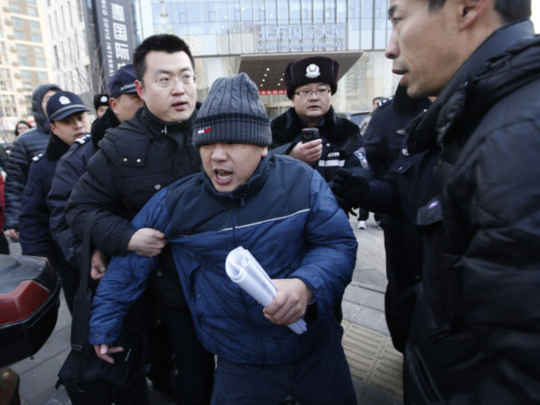
Beijing: Prominent Chinese legal activist Xu Zhiyong was sentenced to four years’ jail on Sunday for his role in organising anti-corruption protests, furthering a crackdown on a rights movement he championed and sparking international criticism.
The 40-year-old lawyer was a central figure in the New Citizens Movement, a loose network of activists, who organised street protests and dinner discussions on causes from educational equality to official corruption.
He is among around 10 activists facing trial for “gathering crowds to disrupt public order” — a charge that carries a maximum five-year sentence. Many had held signs in public urging authorities to disclose their assets as a check against graft, among other causes.
The United States said it was “deeply disappointed” at the verdict.
“We call on Chinese authorities to release Xu and other political prisoners immediately ... and guarantee them the protections and freedoms to which they are entitled under China’s international human rights commitments,” State Department spokeswoman Jen Psaki said in a statement.
Amnesty International described the verdict as “shameful”.
“The Chinese authorities have once again opted for the rule of fear over the rule of law,” Roseann Rife, East Asia research director at Amnesty International, said in a statement.
Xu was the first activist to be sentenced, and the others are almost certain to be found guilty by China’s politically controlled courts.
His jailing comes as new leaders under President Xi Jinping have carried out a high-profile campaign against graft, warning it could destroy the ruling Communist party.
But Beijing fears any organised dissent that could undermine their control, and has previously rejected outside criticism of Xu’s trial as interference in its internal affairs.
A Beijing intermediate court “sentenced Xu Zhiyong to four years in jail” after finding him guilty, it announced on an official account on Sina Weibo, China’s version of Twitter.
Xu’s lawyer Zhang Qingfang criticised the process as “nothing but a show” in which “the outcome was decided a long time ago”.
Describing Xu’s response to the verdict, Zhang said he had told the court that it had “pretty much destroyed the last bit of dignity left for China’s rule of law”.
Zhang said he would like to appeal the decision but would consult with Xu first. He added that police had driven him away from the courthouse after the hearing ended, apparently to prevent him from speaking with a group of journalists nearby.
The premises were cordoned off with police tape, and during the proceedings officers in uniform and plain clothes blocked passers-by from approaching.
Xu gained prominence as he sought to uphold rights through the court system by offering legal aid in controversial cases, and was even profiled by China’s Esquire magazine in 2009.
But as he increasingly pushed for change, he found himself arrested that year on tax evasion charges. Although these were later dropped, he remained under surveillance and sporadic house arrest.
During his one-day trial last Wednesday Xu largely refused to speak, in protest against what he considers unfair proceedings, his lawyer said.
In total 20 to 40 people involved with the New Citizens Movement have been detained since last year, according to members.
Among those whose trials began last week is Zhao Changqing, who was a student leader during 1989 pro-democracy protests at Tiananmen Square and previously served eight years in jail.
Also last week a multimillionaire businessman who backed the New Citizens Movement, Wang Gongquan, was bailed after he apparently confessed to helping “organise and incite criminal activities”, a Beijing court said in a statement.
Human Rights Watch researcher Maya Wang pointed out that he had pursued limited goals compared to dissidents who sought to overthrow the ruling party.
“On the one hand you can see quite clearly that Xu Zhiyong’s organisation across the country threatens authorities. But on the other hand he is among the most moderate among the group of political activists,” she said.
“It does show a certain low tolerance by the authorities towards dissent.”
Members of the New Citizens Movement were “laying low” as detentions and trials proceeded, Wang added.
Willy Lam, a China politics expert at the Chinese University of Hong Kong, said Xi’s administration would likely maintain its tough stance on social unrest — and noted that last week Xi was named head of a new national security commission tasked in part with ensuring domestic stability.
Xu’s sentence “is a warning to dissidents and human rights lawyer and so forth who are perceived as challenging the authority of the party”, Lam said.
The court did not provide additional details about the decision, and searches on Sina Weibo for Xu’s name were blocked — a common occurrence in China’s heavily censored Internet for keywords deemed sensitive.












